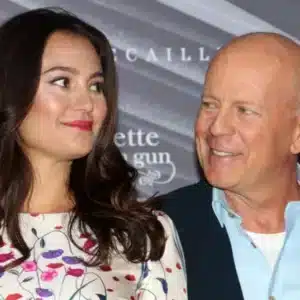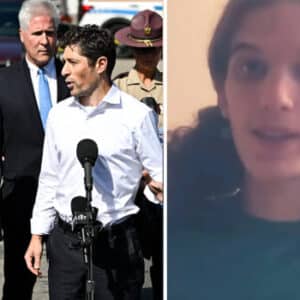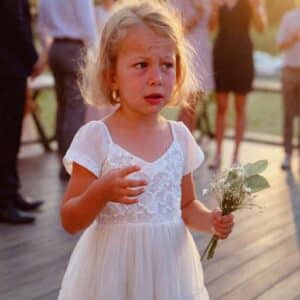The rain fell hard, slicing through the air like glass as Claire stood on the grand stone steps of the Whitmore estate, arms aching from holding her newborn for hours. Her skin was soaked, her bones chilled—but nothing matched the cold settling into her chest.
Behind her, the massive oak doors shut with a final thud, sealing the betrayal in silence.
Edward hadn’t looked at her when he said it.
“It’s over, Claire. We’ll send your things. Please go.”
His mother had hissed,
“You’ve embarrassed this family. This child was not part of the plan.”
Claire didn’t argue. She didn’t beg. She just stared back at the people who once swore love and loyalty, holding the one person who still needed her.
She turned, her baby’s soft whimpers the only sound competing with the storm.
“It’s okay, sweetheart,” she whispered. “Mommy’s here. We’ll survive.”
No umbrella was offered. No one called her a cab. They watched her disappear into the downpour as if washing her away would erase the shame of her existence.
What followed were months of silent battles no one applauded.
Claire slept in church pews. Took buses to nowhere just to stay warm. She played violin underground for coins, sold her jewelry one piece at a time—saving the wedding ring for last, as if parting with it would finally sever the lie she had lived.
She eventually found a tiny room above a corner shop. Mrs. Talbot, the kind widow who owned it, let her stay rent-free if she worked the register. By day, Claire greeted customers with a tired smile. By night, she painted—on scraps, with bargain-bin paints—while her son Nathaniel slept in a laundry basket beside her.
They didn’t have much. But they had each other. And slowly, something new began to grow in the ashes.
It happened three years later, on a summer afternoon in Brooklyn. At a street carnival, Claire’s paintings were propped quietly against a fence. She never expected much. But then a woman in a tailored coat and sharp red lipstick paused.
“Are these yours?”
Claire nodded, unsure whether to feel pride or shame.
“They’re raw,” the woman said. “Wounded. Honest. Alive.”
Vivian Grant—gallery owner, tastemaker, and a name Claire only recognized from art blogs—bought three paintings on the spot and offered Claire her first exhibition.
Claire nearly declined. She had no evening gown. No babysitter. But Mrs. Talbot pressed a dress bag into her arms and said softly,
“Go. Shine.”
And so, she did.
From there, everything snowballed—press, sales, features. Claire’s name became a quiet storm in the art world. She never chased fame. She never spoke about vengeance. But she never forgot the staircase, the rain, or the door that shut behind her.
Five years after she was cast out, Claire stepped through the pristine glass doors of the Whitmore Family Foundation. The name on the building hadn’t changed, but inside, everything had crumbled. Edward’s father had passed. Their influence was waning. They were desperate to revitalize the brand and had extended an invitation to collaborate with a bold, fresh artist.
They didn’t recognize the woman in navy silk who arrived with a poised seven-year-old holding her hand.
Edward did.
His mouth parted as he stood, stunned.
“Claire?”
The PR coordinator interjected cheerfully,
“This is Miss Claire Whitmore. She’s the featured artist for our gala.”
Claire turned, her smile light but unreadable.
“Hello, Edward. Been a while.”
He blinked.
“I didn’t realize—”
“No,” she said simply. “You didn’t.”
She laid out her proposal: a collection titled Unbroken, centered on abandonment, survival, and the quiet triumph of single motherhood. All proceeds would go to shelters for women and children.
One board member hesitated.
“Won’t your family connection complicate things?”
Claire met his eyes.
“There is no connection. The only name I kept was my son’s.”
Edward tried again.
“Claire… about Nathaniel—”
She turned, gaze steady.
“He’s thriving. He’s talented. He knows who stayed and who didn’t.”
The board approved the project without further debate.
The gala opened in a converted chapel. Crowds stretched around the block. But the painting everyone whispered about was one called Exile.
It showed a mother standing in the rain before a castle with closed doors, a baby in her arms. Her posture was proud. A golden thread unraveled from her wrist, disappearing into the sky.
Critics called it haunting. Real. Redemptive.
Edward came on closing night.
He stood quietly before Exile, then turned to see Claire beside him, sipping wine.
“I never meant for this to happen,” he said.
“I know,” she replied. “But you let it.”
“My parents—”
She raised her hand, cutting him off.
“I stood in the rain with your child while you closed the door. That was your choice.”
He swallowed.
“Could I… ever meet him?”
She didn’t look angry—just resolute.
“That’s not my decision. One day, he may choose. Don’t wait too long.”
He nodded.
“Does he still play violin?”
“Piano now. He plays Chopin. Quite well.”
His eyes watered.
“Tell him… I’m sorry.”
“I will,” she said, turning away. “Maybe.”
Years later, Claire founded The Unbroken House, a haven for single mothers and displaced children.
Not out of revenge. Out of love. Out of the belief that survival could become sanctuary.
One evening, as she laid fresh blankets in a room for a young woman and her infant, Claire looked out the window. In the courtyard below, children laughed and ran through the dusk. Among them, twelve-year-old Nathaniel helped a toddler up from the grass.
Claire watched, a soft smile on her face.
“They thought they were casting me out,” she murmured to herself. “But they set me free.”





